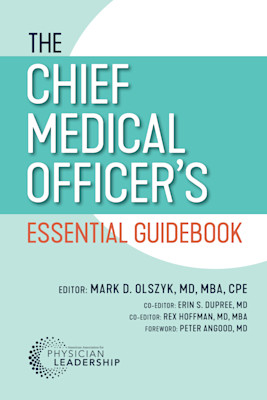The Chief Medical Officer's Essential Guidebook
Paperback
A chief medical officer (CMO) is a senior executive responsible for providing strategic leadership and direction to an organization's medical and clinical affairs. But how does a physician learn how to be an effective CMO? This book is for current CMOs, those aspiring to be CMOs, and the executives and peers who work with them.
This book is a compilation of dozens of medical executives' experiences and lessons, including what they wish they had known before becoming CMOs. A Foreword by Peter Angood, MD, chief executive officer of the American Association for Physician Leadership, puts the book in context for modern physician leadership.
HOW THIS BOOK IS ORGANIZED
Section One — The Plan
What is a CMO? Who wants to be one and why? Let’s start at the beginning and then take a survey course of the physiology of the CMO — body, heart, brains, and spirit.
Section Two — The Anatomy of the CMO
As we consider the skills and talents that make up the ideal CMO, we need to begin with the basics, the building blocks, the essential metabolic functions.
Think of this section as the guts, or bones and sinews, the underlying structural plan of the CMO. These chapters discuss such topics as quality and safety, change management, professionalism, patient experience, the EMR, and dealing with payers.
Section Three — Relationships
Alone you go fast; together you go far. History and recent headlines are replete with the follies of leaders who rely only on themselves for counsel and direction. Medicine is a team sport. CMOs need partners.
This section can be described metaphorically as the heart of the CMO. Authors recount the dynamics of the relationships with the CEO, the CNO, the CFO, the board of directors, and the medical staff leaders. We also learn about the importance of mentoring.
Section Four — Systemic Thinking
Animals evolved eyes and brains so they could navigate their environments. This section is about the brains of the CMO, how the CMO deals with forces outside the hospital: accreditation and ratings agencies, the media, the community. This requires a set of non-clinical skills and the ability to lead teams of non-clinicians.
Section Five — Values
This is the transcendent section, the whole being greater than the sum of its parts. The CMO’s spirit must be oriented toward the highest ideals: equity, justice, respect. The CMO needs to understand ethics and the value of diversity, as well as the historic challenges that continue to affect and influence healthcare delivery now and into the future.
From patient safety, to HealthIT, to working in dyads and inter-professional teams, to interacting with the community and the board, to working with accrediting agencies, to handling the media, this practical book reviews what is expected, how others have stumbled or failed, and how CMOs have found the way to succeed.
Read The Chief Medical Officer's Essential Guidebook to get an inside look at the CMO world, learning from others’ experiences and gaining that secret knowledge necessary to be an effective chief medical officer.
Editor: Mark D. Olszyk, MD, MBA, CPE, is the chief medical officer at Carroll Hospital in Maryland. He earned his medical degree from Columbia University and is board-certified in emergency medicine. He served his country as a U.S. naval officer, deploying overseas with the Marine Corps. He also worked for the Department of Veterans Affairs, where he further honed his skills and expertise. Olszyk is a proud father of four children and has been an active scout leader, with all three of his sons achieving the rank of Eagle Scout. In addition to his many accomplishments, Olszyk also serves as the vice chair of the Maryland Board of Physicians, where he continues to make a positive impact in the medical community.
Co-Editors: Erin S. Dupree, MD, and Rex Hoffman, MD, MBA


